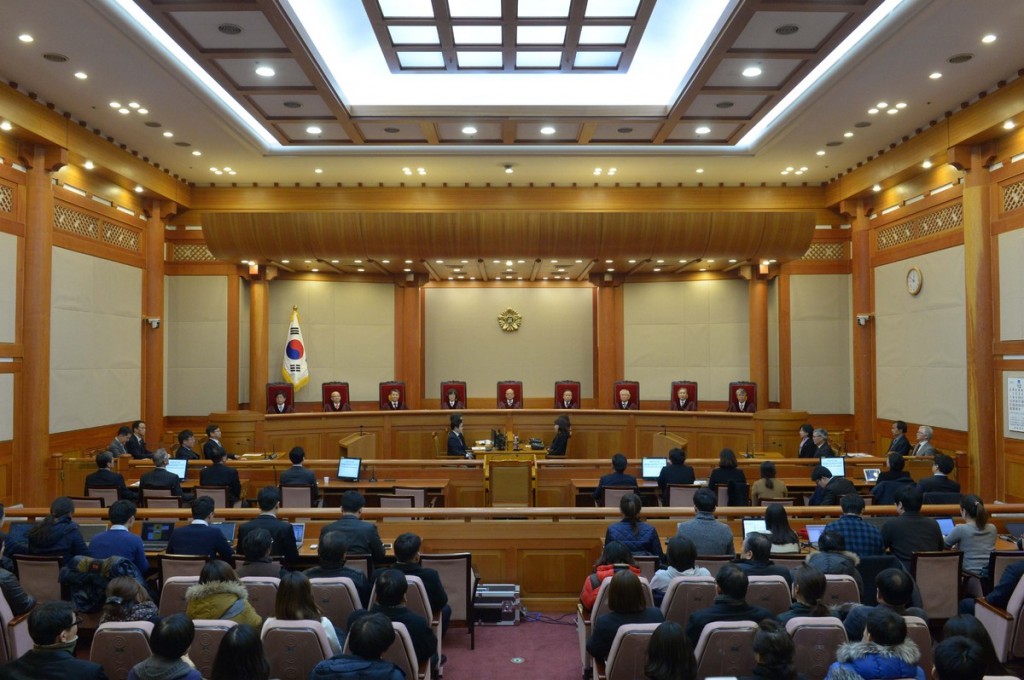- California Assembly OKs highest minimum wage in nation
- S. Korea unveils first graphic cigarette warnings
- US joins with South Korea, Japan in bid to deter North Korea
- LPGA golfer Chun In-gee finally back in action
- S. Korea won’t be top seed in final World Cup qualification round
- US men’s soccer misses 2nd straight Olympics
- US back on track in qualifying with 4-0 win over Guatemala
- High-intensity workout injuries spawn cottage industry
- CDC expands range of Zika mosquitoes into parts of Northeast
- Who knew? ‘The Walking Dead’ is helping families connect
S. Korean court abolishes adultery law, condom stocks soar

South Korea’s constitutional justices rule the country’s decades-old anti-adultery law unconstitutional on Feb. 26, 2015. (Yonhap)
SEOUL, South Korea (AP) — A South Korean court on Thursday abolished a 62-year-old law that bans extramarital affairs, and the stock price of a prominent condom maker immediately shot up 15 percent.
The ruling by the Constitutional Court that the law suppresses personal freedoms could potentially affect thousands of individuals who faced adultery charges since Oct. 31, 2008, a day after the court previously upheld the adultery ban. Current charges could be thrown out and anyone given a guilty verdict would be eligible for a retrial, according to a court official, who didn’t want to be named, citing office rules.
Prosecutors have indicted more than 5,400 people on adultery charges between November 2008 and January this year, according to the Supreme Prosecutors’ Office.
Under the law having sex with a married person who is not your spouse was punishable by up to two years in prison. Nearly 53,000 South Koreans have been indicted on adultery charges since 1985, but prison terms have been rare.
The stock price of South Korean condom maker, Unidus Corp., shot up after the court ruling, surging by the daily limit of 15 percent on South Korea’s Kosdaq market.
The debate over the adultery ban, which has been part of South Korea’s criminal law since 1953, intensified in recent years as fast-changing social trends challenged conservative traditional values.
Supporters of the law had claimed it promotes monogamy and keeps families intact, while opponents argued that the government has no right to interfere with people’s private lives and determine their sexual affairs.
The court was acting on 17 complaints submitted from 2009 to last year by individuals who have been punished for adultery or whose trials have been suspended, pending Thursday’s ruling.
Seven judges of the court, which rules on the constitutionality of laws, supported the ruling, while two dissented, the court said. The support of six judges is needed to abolish a law.
“(The law) excessively restricts citizens’ basic rights, such as the right to determine sexual affairs,” the court said in explaining that the law no longer contributed to overall public interest.
It was the fifth time the court had reviewed the adultery ban since 1990. The last time, in October 2008, five of the judges said the law was unconstitutional.
Legal experts have said that the adultery ban had lost much of its effect as people were increasingly settling their marriage disputes in civil courts. Adultery can be prosecuted only on a complaint made by a spouse who has filed for divorce. The case immediately ends if the plaintiff drops the charge, which is common when financial settlements are reached.
“Recently, it was extremely rare for a person to serve a prison term for adultery,” said Lim Ji-bong, a law professor at Sogang University in Seoul. “The number of indictments has decreased as charges are frequently dropped.”















